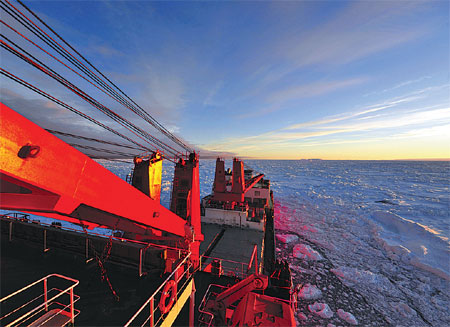Trapped ship Xuelong likely free Monday
|
The Chinese icebreaker Xuelong is trapped in the heavy floes in Antarctica after rescuing 52 passengers stranded on a Russian vessel. Zhang Jiansong / Xinhua |
Forecasts say the Chinese icebreaker may soon escape Antarctic ice floes
An emergency team has been formed to plan the rescue of passengers and crewmembers aboard the trapped Chinese icebreaker Xuelong, which is expected to break free from the ice on Monday, China Central Television reported on Saturday.
The vessel got stuck after participating in the Thursday rescue of a Russian icebreaker ensnared in an ice floe.
"Those aboard are safe and have enough food," Qu Tanzhou, director of the Chinese Arctic and Antarctic Administration under the State Oceanic Administration, told China Daily in a telephone interview on Saturday.
He said Xuelong will take the opportunity to chop through the heavy floes if the weather permits on Monday.
The team of experts from such relevant departments as the Chinese Arctic and Antarctic Administration, the Polar Research Institute of China and the National Marine Environmental Forecasting Center will maintain 24-hour contact with the vessel, State Oceanic Administration director Liu Cigui told CCTV.
The team was formed after President Xi Jinping called for all-out efforts to ensure the safety of those aboard on Friday, saying the ship's rescue mission won honor for China and its people.
Xi said the team should respond to the situation calmly and soon return safely.
He sent regards and greetings to the 101 passengers and 42 crewmembers aboard Xuelong and ordered coordinated efforts to free them.
Xuelong has been sailing back and forth over a 1-kilometer span to prevent the vessel from being frozen in the ice, the ship's captain Wang Jianzhong told CCTV.
Wang said tidal conditions are extremely complex in this area, which is experiencing high tides, and the positions of the iceberg and floes are rapidly changing.
Yu Haipeng, a meteorologist on board, said the situation worsened when the wind picked up on Saturday. The ice is up to 4 meters thick near the vessel.
Xuelong can break ice about 1.1 meters thick when traveling at 2.8 kilometers per hour.
A massive, flat iceberg is floating to the vessel's left, sometimes drifting as close as 2.3 km, Wang said.
Xuelong will try to maneuver through the ice only after the giant iceberg drifts away, he added.
Zha Enlai, an iceberg scientist on board, said at least seven icebergs are floating within several km, threatening the vessel's safety.
Jia Shuliang, captain of the helicopter Xueying 12, or Snow Eagle 12, aboard the vessel, told CCTV the helicopter is ready to fly to survey the ice floe surrounding Xuelong.
Another challenge is the lack of geological and environmental information about the area, the expedition team's deputy director Xu Ting told CCTV.
The expert team in Beijing will provide real-time updates on weather and ice twice a day.
Xu said the potential for emotional instability, and especially frustration, may pose another challenge, since those aboard have been at sea for nearly two months.
The Chinese icebreaker Xuelong, or Snow Dragon, got stuck in the ice after rescuing 52 passengers from the Russian ship Akademik Shokalskiy in Antarctica on Thursday. The Australian Maritime Safety Authority also confirmed on Saturday that Xuelong failed to chop through the ice on Saturday morning, and personnel on board face no immediate danger.
Qu said that after rescuing those aboard Akademik Shokalskiy, strong cyclones and water flows pushed ice floes into an ice gorge, stranding Xuelong.
The Australian vessel Aurora Australis was placed on standby in open waters nearby on Friday evening as a precaution.
The heads of both the Russian vessel and Xuelong agreed on Saturday morning that further assistance from Aurora Australis is no longer needed, and the Chinese and Russian icebreakers can support each other.
The rescue of those aboard Akademik Shokalskiy, which was stranded in Antarctica for 10 days, was completed on Friday morning.
Xuelong left Shanghai in early November on China's 30th Antarctic expedition, which was expected to last 155 days. The mission involves scientific research, construction of the country's new research base and the site inspection of another base.
"The stranding will force the expedition to be rescheduled," Qu says.
"We will discuss that after the ship breaks free."

























